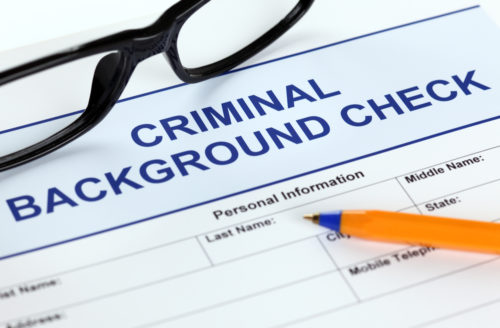If you’ve ever applied for a job, rented an apartment, or purchased a firearm, you’ve probably been the subject of a background check. However, if you’ve done these things, or even gotten a credit card or a personal loan, then you’ve probably also had someone looking at your credit report.
Credit reports and background checks are often used by the same people for similar purposes. Ultimately, anyone who runs a background check on you or requests a credit report is trying to learn more about you to help them make an informed decision about what to do with you — or not do. Since these two investigative tools have so much overlap, it’s natural to wonder: what is the difference between a credit check and a background check?
Table of Contents
What is a Background Check?
Background checks are typically performed as part of the employment process for many sensitive jobs. This can include jobs where someone is expected to work with sensitive information or individuals, such as a job at a government agency or school, but many employers these days will perform a background check on potential employees as a way of cultivating a good working environment and company culture. Ultimately, a background check is used to judge a person’s character and fit for the position that they are applying for, whether it be a job or a unit in an apartment complex that likes to carefully manage its community.
How is a background check able to help someone render a character judgement? That has to do with the sorts of things that a background check can dig up. At the bare minimum, a criminal background check will provide the requesting party with information about a person’s criminal record. However, many background checks will also dig a little deeper. Some will include information such as education, employment history, and civil records such as marriage or birth certificates.
Employers and apartment managers will run a background check to make sure that an applicant doesn’t have any sort of criminal history that may threaten their communities. However, background checks also enable these people to fact check applications — lies on an application will be revealed when the background check comes back with different information.
Is a Credit Check Included in a Background Report?
Background checks will sometimes include the subject’s credit report. However, credit reports are often independent of a lot of material that background checks typically cover. The difference between a credit report and a background check in this instance has to do with purpose — your credit score won’t reveal very much about your character, while you background check will. Instead, if an employer or renting agency needs to see your credit score, they will often request a separate credit report.
When is a Background Check Performed?
Background checks are performed most often to find out if a person is of good character with little to no significant criminal history. Here are some cases in which a background check might be performed:
- When you apply for a job with access to information. If you want to work for a government agency where you may be required to handle sensitive information, then you had better be ready to pass a background check. Government background checks are often more in-depth than your usual background check.
- When you apply for a job where good character is a requirement. For some jobs you just need to be able to conduct yourself responsibly in stressful situations. If you’d like to join the police force or become a teacher, a background check will absolutely be required.
- When you apply for a job at a company that values workplace culture. More and more companies are valuing the environment that their employees work in. Oftentimes, this means subjecting new employees to a background check in order to make sure that they will be a good fit for the company culture and not pose any danger to their fellow employees.
- When you apply to rent an apartment or home. Landlords and apartment managers will often run background checks on potential tenants. The reasons here are twofold. First, landlords want to protect their property from tenants who may not treat it well. Second, apartment managers often want to bring in tenants who will contribute to a positive community culture.
- When you purchase a firearm. When you purchase a firearm from an authorized dealer, they will often be required to perform a background check on you before completing the sale. Gun retailers will use the FBI’s National Instant Criminal Background Check System (NICS) to check a potential buyer’s criminal record before completing the sale.
Although there are many situations in which someone may want to run a background check on you, background check regulations prevent anyone from getting your information without getting your written permission first.
Unlike credit checks, background checks are performed in a wide variety of situations, some of which require a background check by law. However, when an interested party performs a credit check to learn your credit history, they often have a single goal in mind: to learn whether or not you are able to handle debt responsibly.
Credit checks can come from your employer (if your job requires financial savvy) or landlord (if there are concerns about your ability to pay rent), but in these cases a credit check is done for different reasons than a background check.
Can I Get My Own Background Check?
If you’ve ever had any interest in improving your credit score, then you have probably taken a look at your own credit report. Similarly, if you are interested in finding out what potential employers are seeing when they run a background check on you, you can do a background check on yourself. Any background check agency will be able to provide you with your information.
In fact, seeing your own background check can be a good idea if you suspect that it may have some errors. Just like credit reports, background checks can be wrong from time to time — and having a flawed background check can cost you. You can fix credit report mistakes and you can fix mistakes on your background check as well.
Disputing Errors in Your Background Report
If you find an error on your background check, your first step should be to file a complaint with the screening company that prepared your report. If you think a potential employer may have read an incorrect report on your background, then you should ask them which screening company they used — employers are required by law to give you this information.
As a last resort, you may file a complaint with the FTC. They are the government agency with the power to investigate background check companies for wrongdoing.
Background checks and credit checks are used by a lot of the same parties, but often for very different purposes. Employers and landlords will often use background checks to investigate your criminal history and character, while they will use a credit check to determine how well or poorly you handle debt.
Looking for more information on your credit score and who will check it? Visit our credit score resource center for more articles and guides.
Image Source: https://depositphotos.com/





